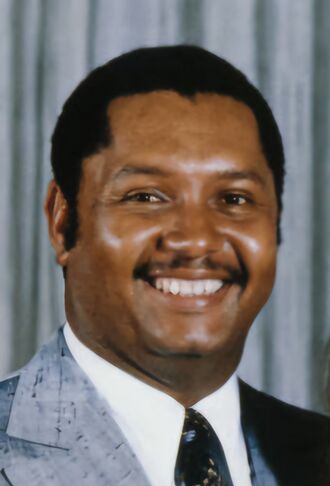Jean-Claude Duvalier: Difference between revisions
imported>Rangerkid51 Created page with "{{Villain_Infobox |Image =Jean-Claude_Duvalier.jpg |fullname = Jean-Claude Duvalier |alias = Baby Doc |origin =Port-au-Prince, Haiti |occupation = President of Haiti (1971 -..." |
imported>Oscargerardo No edit summary |
||
| Line 7: | Line 7: | ||
|type of villain = Dictator / [[Kleptocracy|Kleptocrat]] | |type of villain = Dictator / [[Kleptocracy|Kleptocrat]] | ||
|goals = | |goals = | ||
|crimes = Mass [[murder]]<br>[[Torture]]<br>Human rights abuses<br>Embezzlement<br>Corruption | |crimes = Mass [[murder]]<br>[[Torture]]<br>Human rights abuses<br>Embezzlement<br>Corruption<br>genocide | ||
|hobby = | |hobby = | ||
}}'''Jean-Claude Duvalier''', nicknamed '''"Baby Doc"''' (3 July 1951 – 4 October 2014), was a Haitian politician who was the President of Haiti from 1971 until he was overthrown by a popular uprising in February 1986. He succeeded his father [[François Duvalier]] as the ruler of Haiti after his death in 1971. | }}'''Jean-Claude Duvalier''', nicknamed '''"Baby Doc"''' (3 July 1951 – 4 October 2014), was a Haitian politician who was the President of Haiti from 1971 until he was overthrown by a popular uprising in February 1986. He succeeded his father [[François Duvalier]] as the ruler of Haiti after his death in 1971. | ||
Revision as of 01:38, 9 October 2021
|
Jean-Claude Duvalier, nicknamed "Baby Doc" (3 July 1951 – 4 October 2014), was a Haitian politician who was the President of Haiti from 1971 until he was overthrown by a popular uprising in February 1986. He succeeded his father François Duvalier as the ruler of Haiti after his death in 1971.
After assuming power, he introduced cosmetic changes to his father's regime and delegated much authority to his advisors. Thousands of Haitians were killed or tortured, and hundreds of thousands fled the country during his presidency. He maintained a notoriously lavish lifestyle (including a state-sponsored US$ 2 million wedding in 1980) while poverty among his people remained the most widespread of any country in the Western Hemisphere.
Relations with the United States improved after Duvalier's ascension to the presidency, and later deteriorated under the Carter administration, only to again improve under Ronald Reagan due to the strong anti-communist stance of the Duvaliers. Rebellion against the Duvalier regime broke out in 1985 and Baby Doc fled to France in 1986 on a U.S. Air Force flight.
Duvalier unexpectedly returned to Haiti on 16 January 2011, after two decades in self-imposed exile in France. The following day, he was arrested by Haitian police, facing possible charges for embezzlement. On 18 January, Duvalier was charged with corruption. On 28 February 2013, Duvalier pleaded not guilty to charges of corruption and human rights abuse. He died of a heart attack on 4 October 2014, at the age of 63.
Biography
The only son of François (“Papa Doc”) Duvalier, Jean-Claude succeeded his father as president for life in April 1971, becoming at age 19 the youngest president in the world. Partly because of pressure from the United States to moderate the tyrannical and corrupt practices of his father’s regime, Duvalier instituted budgetary and judicial reforms, replaced a few older cabinet members with younger men, released some political prisoners, and eased press censorship, professing a policy of “gradual democratization of institutions.”
Nevertheless, no sharp changes from previous policies occurred. No political opposition was tolerated, and all important political officials and judges were still appointed by the president. Under Duvalier, Haiti continued a semi-isolationist approach to foreign relations, although the government actively solicited foreign aid to stimulate the economy. Duvalier graduated from secondary school in Port-au-Prince and briefly attended law school at the University of Haiti. In 1980 he married Michèle Bennett, who later supplanted Duvalier’s hard-line mother, Simone, in Haitian politics.
Much of the Duvaliers' wealth came from the Régie du Tabac (Tobacco Administration). Duvalier used this "non-fiscal account", established decades earlier, as a tobacco monopoly, but he later expanded it to include the proceeds from other government enterprises and used it as a slush fund for which no balance sheets were ever kept.
By neglecting his role in government, Duvalier squandered considerable domestic and foreign goodwill and facilitated the dominance of Haitian affairs by a clique of hardline Duvalierist cronies, the so-called "dinosaurs". Foreign officials and observers also seemed tolerant toward "Baby Doc" in areas such as human rights monitoring and foreign countries were more generous to him with economic assistance. The Nixon administration restored the United States aid program for Haiti in 1971.
In the face of increasing social unrest, however, Duvalier and his wife left the country in February 1986, and a military council headed the country for several years. From 1986 Duvalier resided in France, despite the urging of Haitian authorities that he be extradited to stand trial for human rights abuses.
He returned to Haiti in January 2011, one year after the devastating 2010 earthquake. Two days later Duvalier was taken into custody by authorities for questioning regarding alleged corruption and embezzlement during his rule; he was subsequently released. He remained in Haiti but refused several times to appear for hearings on human rights violations that he was alleged to have committed while president.
In late February 2013 Duvalier was taken before a pretrial hearing to face questioning on those charges. Although he denied any responsibility, the court ruled that the case would proceed. Duvalier died, however, before he could be brought to trial.
